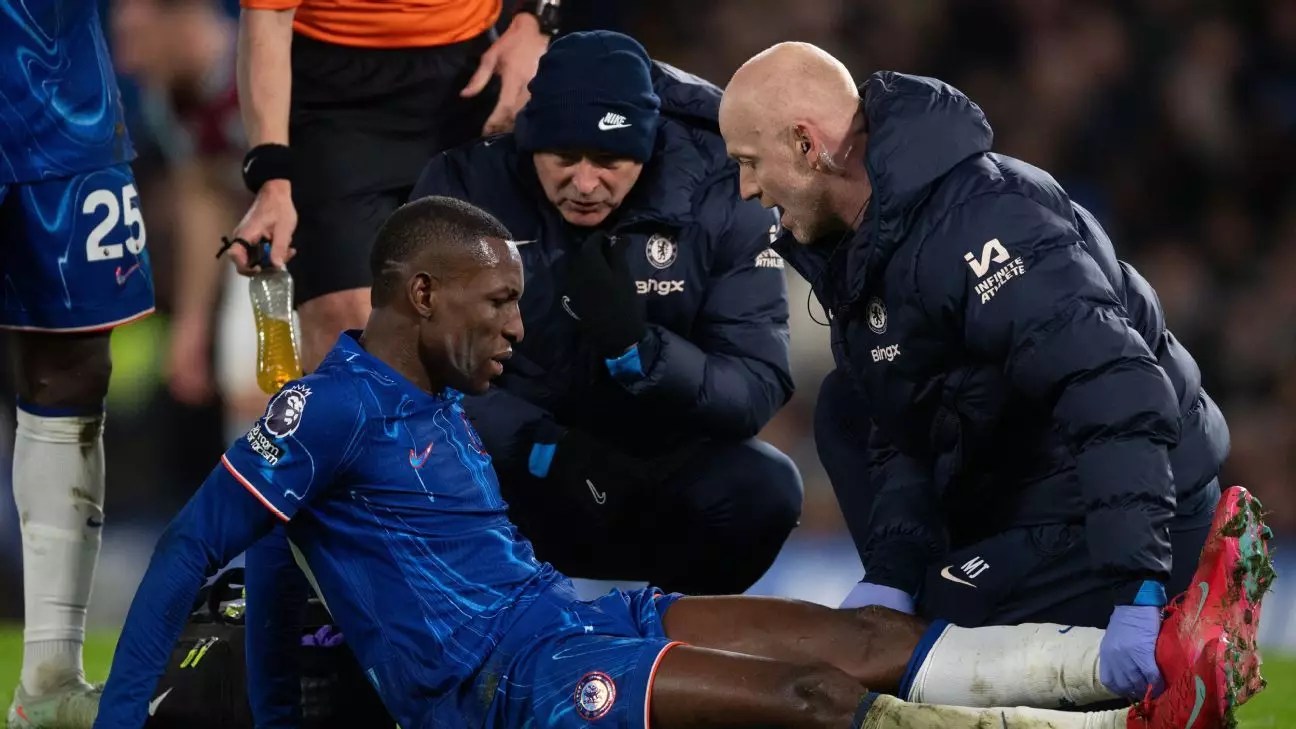In the world of professional football, injuries are an inevitable part of the game that can have significant impacts on a team’s performance, especially when key players are sidelined. Chelsea FC finds itself grappling with this bitter reality, as head coach Enzo Maresca confirmed that striker Nicolas Jackson will be out until early April due to a hamstring injury sustained during a match against West Ham United on February 3. This shortfall not only challenges the technical abilities of the squad but also raises questions about the team’s overall cohesion and tactics moving forward.
Initially, there was optimism surrounding Jackson’s injury prognosis. A scan earlier this week revealed a more severe muscular issue than previously anticipated, and Maresca’s announcement that he would likely be out for six to eight weeks has left fans and the coaching staff in a state of concern. “We all thought it was not a big injury,” Maresca stated, highlighting the challenges coaches face in accurately predicting recovery times based on a player’s immediate feedback. The upcoming international break may offer a glimmer of hope, as Jackson could potentially return to action shortly thereafter, but the loss of his playing style and contribution to the team cannot be understated in the interim.
Jackson’s injury forces Chelsea to rethink their strategy and approach to upcoming fixtures. With options limited, Maresca must consider utilizing alternative formations or players to compensate for Jackson’s unique skill set. One of the possible lineups could involve Cole Palmer stepping into the role of a false nine. Alternatively, Christopher Nkunku’s situation, after failing to secure a move to Bayern Munich, might provide a chance for redemption, albeit he is not a direct replacement for the missed striker. The coach could also contemplate converting a winger into a forward position, though this carries its own risks and uncertainties.
The situation illustrates the agility required of coaching when confronted with unforeseen player absences. While some may revel in the opportunity for less stereotypical decisions, such as rotating players into different positions, the underlying tension of performing without a recognized nine looms large. Maresca’s insights about Jackson’s importance to the squad reveal the often-overlooked reality that a player’s true value may only be recognized in their absence.
Goalkeeping Conundrums: A Shift in Between the Posts
In addition to Jackson’s predicament, Chelsea has been unsettled in their goalkeeping department. Maresca confirmed that Filip Jørgensen has been named the first-choice goalkeeper, taking over from Robert Sánchez—a move prompted by Sánchez’s troubling performances, including critical errors during recent games. This shift underscores the psychological components of the game where mental burnouts can affect player performance.
Maresca’s approach to managing the goalkeeping situation illustrates a careful balancing act between performance and mental health considerations for his players. Jørgensen’s two Premier League appearances since his signing denote a newfound reliance, but simultaneously, effective communication and transparency with Sánchez are essential to maintaining team morale and unity in such critical positions.
Upcoming Matches and Potential Returns
Chelsea’s resilience will be tested further in their forthcoming fixtures, with a notable match against Brighton on the horizon. The absence of Jackson will undoubtedly impact their offensive strategies, making it essential for the squad to adapt quickly. Maresca provided a sliver of hope regarding the potential returns of injured players Romeo Lavia and Benoît Badiashile, while Wesley Fofana’s gradual recovery adds another layer of optimism to the lineup.
As Chelsea fans await the influence of these potential reinforcements, the onus is on Maresca and his tactical ingenuity to navigate through this period marked by instability. The challenge is substantial, but it also offers opportunities for emerging players to step up and make their mark, thereby contributing to the collective ethos of resilience that defines any successful football club.
Chelsea’s current injury crisis serves as a poignant reminder of the unpredictable nature of football. While the loss of key players like Nicolas Jackson can be disheartening, it simultaneously provides a platform for growth, adaptation, and teamwork—qualities that could define Chelsea’s season moving forward.


Leave a Reply